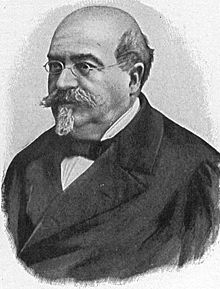Mihail Kogălniceanu
| Mihail Kogălniceanu | |
|---|---|
 |
|
| Prime Minister of Romania | |
|
In office October 11, 1863 – January 26, 1865 |
|
| Monarch |
Alexandru Ioan Cuza Carol I of Romania |
| Preceded by | Nicolae Kretzulescu |
| Succeeded by | Nicolae Kretzulescu |
| Foreign Affairs Minister of Romania | |
|
In office April 27, 1876 – July 23, 1876 April 3, 1877 – November 24, 1878 |
|
| Preceded by |
Dimitrie Cornea Nicolae Ionescu |
| Succeeded by |
Nicolae Ionescu Ion C. Câmpineanu |
| Internal Affairs Minister of Romania | |
|
In office October 11, 1863 – January 26, 1865 November 16, 1868 – January 24, 1870 November 17, 1878 – November 25, 1878 July 11, 1879 – April 17, 1880 |
|
| Preceded by |
Nicolae Kretzulescu Anton I. Arion C. A. Rosetti Ion Brătianu |
| Succeeded by |
Constantin Bosianu Dimitrie Ghica Ion Brătianu Ion Brătianu |
| Personal details | |
| Born |
September 6, 1817 Iași, Moldavia |
| Died | July 1, 1891 (aged 73) Paris, France |
| Nationality | Moldavian, Romanian |
| Political party | National Liberal Party |
| Spouse(s) | Ecaterina Jora |
| Profession | Historian, journalist, literary critic |
| Religion | Romanian Orthodox |
| Signature |  |
Mihail Kogălniceanu (Romanian pronunciation: [mihaˈil koɡəlniˈt͡ʃe̯anu]; also known as Mihail Cogâlniceanu, Michel de Kogalnitchan; September 6, 1817 – July 1, 1891) was a Moldavian, later Romanian liberal statesman, lawyer, historian and publicist; he became Prime Minister of Romania on October 11, 1863, after the 1859 union of the Danubian Principalities under Domnitor Alexandru Ioan Cuza, and later served as Foreign Minister under Carol I. He was several times Interior Minister under Cuza and Carol. A polymath, Kogălniceanu was one of the most influential Romanian intellectuals of his generation. Siding with the moderate liberal current for most of his lifetime, he began his political career as a collaborator of Prince Mihail Sturdza, while serving as head of the Iași Theater and issuing several publications together with the poet Vasile Alecsandri and the activist Ion Ghica. After editing the highly influential magazine Dacia Literară and serving as a professor at Academia Mihăileană, Kogălniceanu came into conflict with the authorities over his Romantic nationalist inaugural speech of 1843. He was the ideologue of the abortive 1848 Moldavian revolution, authoring its main document, Dorințele partidei naționale din Moldova.
...
Wikipedia
